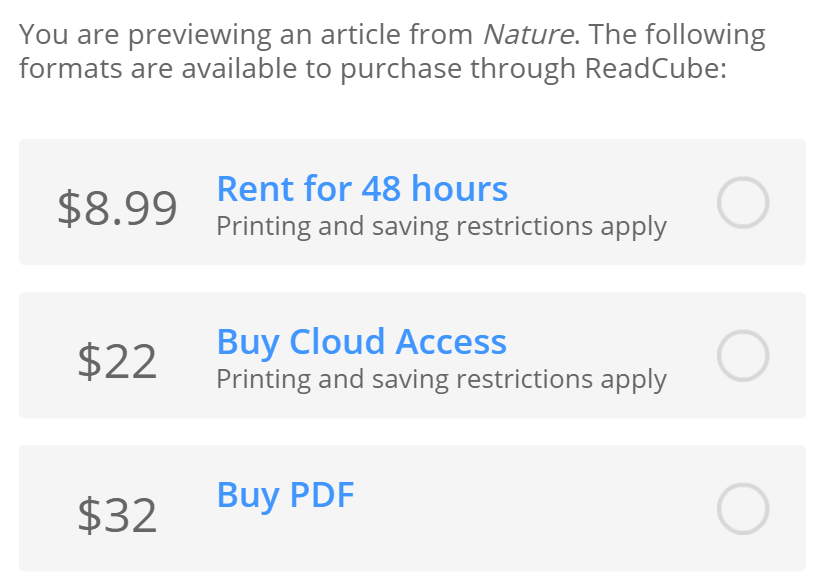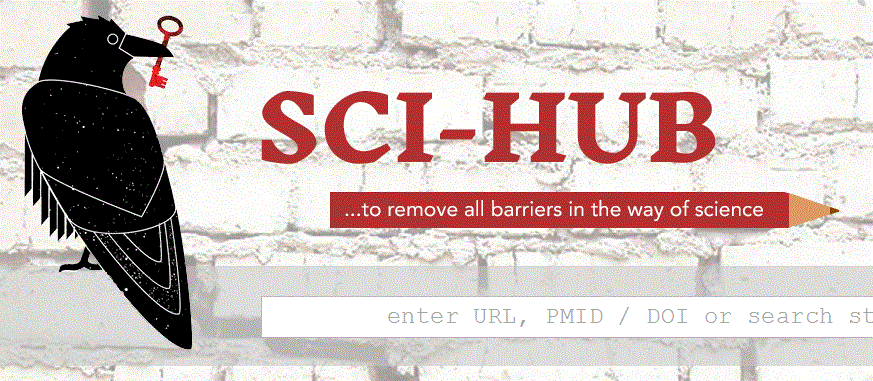Stop feeding publishers. EU develops rules for compulsory free access to research

The annual volume of the market for paid access to scientific publications is estimated at $ 25 billion. The
policy of modern scientific publications on closing access to scientific publications with a paywall has long been a cause of controversy in society. On the one hand, it is argued that restricting access to scientific knowledge is unacceptable in conditions of the general free circulation of information. On the other hand, it is said that the institute of publishing, reading and reviewing scientific works by professional publishers is necessary in order to screen out irrelevant, manipulated and simply not real research from real scientific works. It comes to the point of absurdity: private scientific publications make a profit from the publication of studies that are carried out for the money of taxpayers
In fact, now science (in the form of publication of works) is under the “boot” of the publishers of specialized journals, who are the only recipients of the benefits in this situation. The problem of closed scientific publications has become so acute that even government agencies have paid attention to this, specifically the European Center for Political Strategies at the European Commission. A number of scientists have spoken against concealing scientific works from the general public over the past decades.
European Commissioner Carlos Moidas, representatives of the scientific community of the EU and the Organization Science Europe developed a « Plan the S ». Its essence is extremely simple:All scientific research that will be financed from the state budgets of EU countries or EU funds should be publicly available from January 1, 2020.
If you try to find the most high-margin business that you should do, then the way to you is to scientific publishers on the paywall model. The “rise” in this type of activity is up to 40% compared to costs, that is, it is more profitable to only trade people or prohibited substances (and it’s not a fact that you will achieve such profits).
At the same time, “Plan S” is not the first attempt of the scientific community to get rid of peyvall bondage. Back in 2003, the Berlin Declaration was signed.According to which, in connection with the advent of the digital era, the existing channels for the delivery and dissemination of scientific knowledge are irrelevant. The signatories of the declaration were in favor of free, free copying, creation of small editions for the point use of scientific works and publications, subject to the basic copyright. In fact, the Berlin Declaration tried to extend the term “Fair Use” to scientific work.In addition, the signatories of the Berlin Declaration sought to encourage colleagues to openly disseminate the results of their research, subject to receiving government and other grants, to encourage distributors of such information and to support the paradigm of the free exchange of knowledge in digital form in every way (that is, if this is not a “bloody law”) then share with the world).
Unfortunately, since 2003, almost nothing has changed and modern scholars and students have maximum access to limited pre-prints of publications, and free scientific publications do not always receive the most interesting and important works for publication.
The problem of reviewing and countering Open Access Science and Plan S
Those who are familiar with the problem of “paid science” have certainly heard the argument that high-quality peer review and publishing are expensive. That is why peyvoll on scientific articles is necessary - it is a "quality mark".
At various times, various structures and even the media made injections that another “junk” study was accepted for publication in a hundred or so free scientific journals. One of the last fairly large "stuffing" occurred in 2013, when an opponent of OA-science conducted a study " Who is afraid of reviewing? " And published a fake scientific article in 157 free scientific journals (97 more rejected the material).
Then, in this situation, comrades from Cyberleninki skated perfectly with a skating rink, and in this publication on Habré five main myths of the “open access science” were laid out on the shelves.
Access to relevant scientific knowledge - problem / Reader cannot access any article through interlibrary lending.
The problem of paid access to scientific publications is unsolvable even at the state level and the publishers postulate that “who needs to — will buy access to the full text of the work” is not consistent. So that you understand, a full PDF of one scientific work in the same Nature costs $ 32:

The publication opposes the initiative of the European Commission, making fear of the audience in such publications .
How scientific publications earn money from scientists, without bringing anything useful to science, can be found in the documentary film Paywall: The Business of Scholarship.
The lower the level of sponsorship of science in the country, the more difficult it is for its scientists to gain access to the latest scientific knowledge. For Russia, this problem is particularly acute, since domestic scientists cannot even get free access to works that were conducted domestically due to the policies of the main scientific publishing house MAIK Science / Interperiodica, which strictly forbids self-publishing.
Magazines of open access are allegedly not reviewed.
This postulate is actively promoted in all publications against initiatives of free access to scientific knowledge (for example, in the same article Nature , the link to which was cited just above).
Publishers in one voice shout that they bear the exorbitant costs of reviewing the work and deliver the audience only high-quality and proven content. The problem is that fake or juggled studies with enviable regularity seep into peer-reviewed paid publications, which they prefer to keep silent about. At the same time, journals that exist with the direct support of non-profit organizations and governments successfully cope with the review of articles.
On the other hand, this argument of publishers about “quality content” looks more and more sluggish if you look at our native area - Computer Science. The postulates of Open Source, the Linux Foundation community, GitHub source code repositories, and the ability to analyze and discuss them with a wide range of experts make software only better. It makes no sense to deny it, because even large corporations are actively joining the Open Source-community, for example, Microsoft and Facebook. So why can't these principles work in the rest of the scientific world? After all, Microsoft does not lose the right to their development, publishing them on GitHub, and share their achievements with the rest of the world.
Some scientists oppose Plan S
Along with the initiative of the European Commission , an open letter from scientists ( full text ) appeared in the network , who consider this method of regulation dangerous for European science. At the time of this writing, over 1,400 people have signed up for it.
The point is simple: scientists worry that new restrictions within Plan S (if government grants or EU money were included in the research budget, the results should be published in journals free for readers) will reduce the choice of sites for publication by 80-90% for many areas of science . That is, the current system of publishing scientific papers is so tightly bogged down in the Paywall model that there are simply no alternative free journals.
Disputes arise around the situation where only part of the research team will fall under the Plan S directives. Will it then be necessary to comply with the directives of the European Commission, or will scientists be able to place the results of their research in a more eminent, but paid edition for the reader?
The question of prestige in the scientific community is almost as acute as in show business, as are the personal ambitions of many scientists. For a significant part of them, it is more important to get professional recognition of famous colleagues than to provide wide access to their work. Opponents of Plan S cite data that the coalition for the free distribution of work includes only 11 funds supporting free journals, and this is only from 3 to 4.1% of the world market for published scientific works. That is, the power of the European Commission and classical scientific publishers in terms of infrastructure is categorically unequal. Plan S has only one advantage - the support of state regulators, whose decision will be almost impossible to challenge if the directive comes into force (recall the GDPR).
Also, Plan S team is actively negotiating with structures outside the European Union, primarily with colleagues from the United States. But according to the scientific community, negotiations and intentions are not enough - scientists demand guarantees that their work will not disappear with the entry into force of Plan S.
Blocking Sci-Hub and countering scientific "piracy" by publishers in Russia and the world

Publishers have achieved their goal: the credibility of free journals is currently seriously undermined and scientists are forced to choose between “reach and prestige”. More often the last is chosen, which ultimately hurts the entire scientific community.
In addition, publishers very subtly manipulate the notion of “copyright” of “neighboring law” and in courts seek blocking of Internet libraries in which scientific works, initially closed by the paywall, are published. In fact, now we are seeing a systematic substitution of the notions of the rights of the distributor and the rights of the direct author.
The real copyright holder for the results of scientific work are either the scientists themselves (groups of scientists) or educational institutions that sponsored the research. About any alienation of realrights to scientific work are out of the question, because journals receive, in fact, only the right to publish and sell access to work to other scientists and institutions. Violation of real copyrights to work is possible only in two cases: with plagiarism in the course of another study, as was the case, for example, in the history of Perelman and Chinese mathematicians, or the misappropriation of research results and their commercial use without the consent of the authors.
In both cases, the publisher cannot by any means be involved in the infringement of “copyright”, which magazines love to talk about. The actions of libraries such as Sci-Hub, Cyberlenink, and other resources simply harm the publishing business and reduce the margin of the magazine owners. In the case of the existence of a global institute of free access to scientific results, even reviewers will not suffer, just the cost of their work will be included in allocated grants / extinguished non-profit organizations that support the development of world science.
However, this does not prevent courts around the world from imposing sentences that are frankly harmful to all of humanity and oblige regulators and even certificate authorities to block the work of pirated scientific libraries. So, last week, the court ordered Roskomnadzor to block Sci-Huband a number of its mirrors due to the publication of three articles, and the Association of Scientific Publishers of the American Chemical Society (ACS) previously won a $ 4.8 million trial from Sci-Hub, which estimated the damage from the library’s activities. In addition, a US court ordered Comodo to withdraw Sci-Hub certificates.
Perhaps the new initiative of the European Commission will be able to reverse this situation and everyone will be able to get access to the scientific work of Europeans who were paid from taxes.
